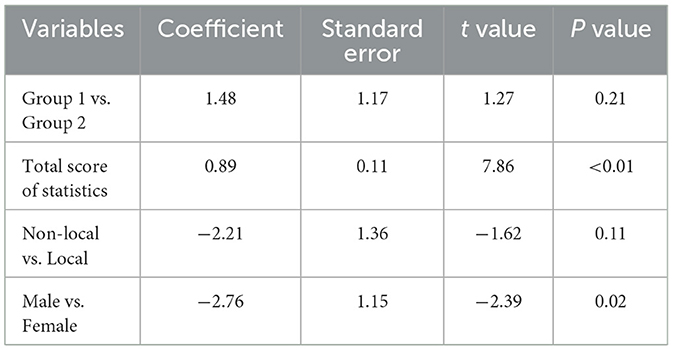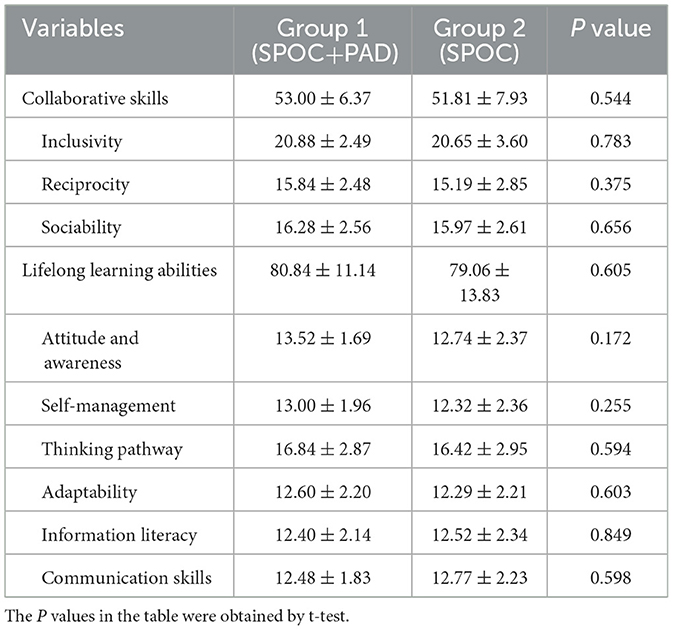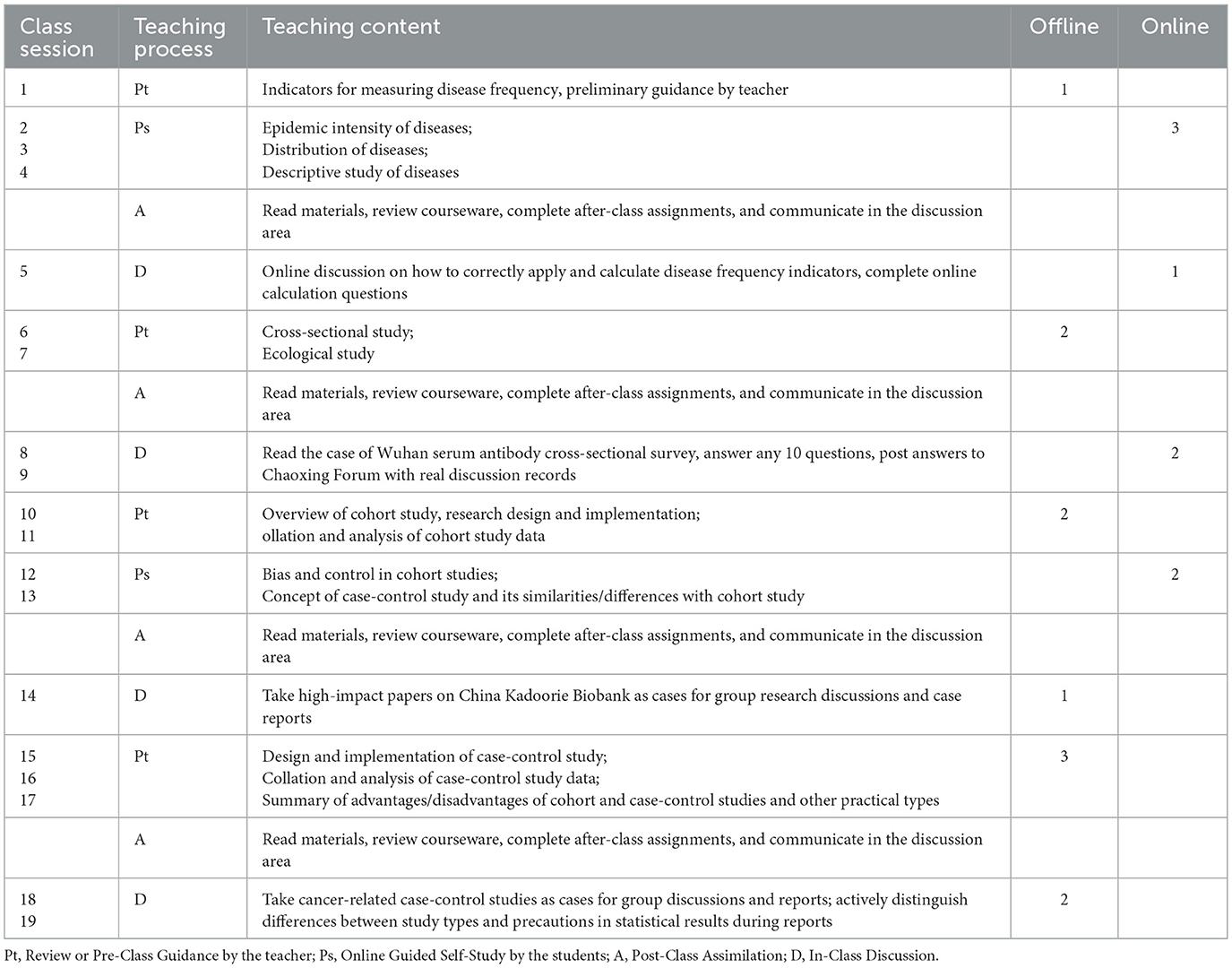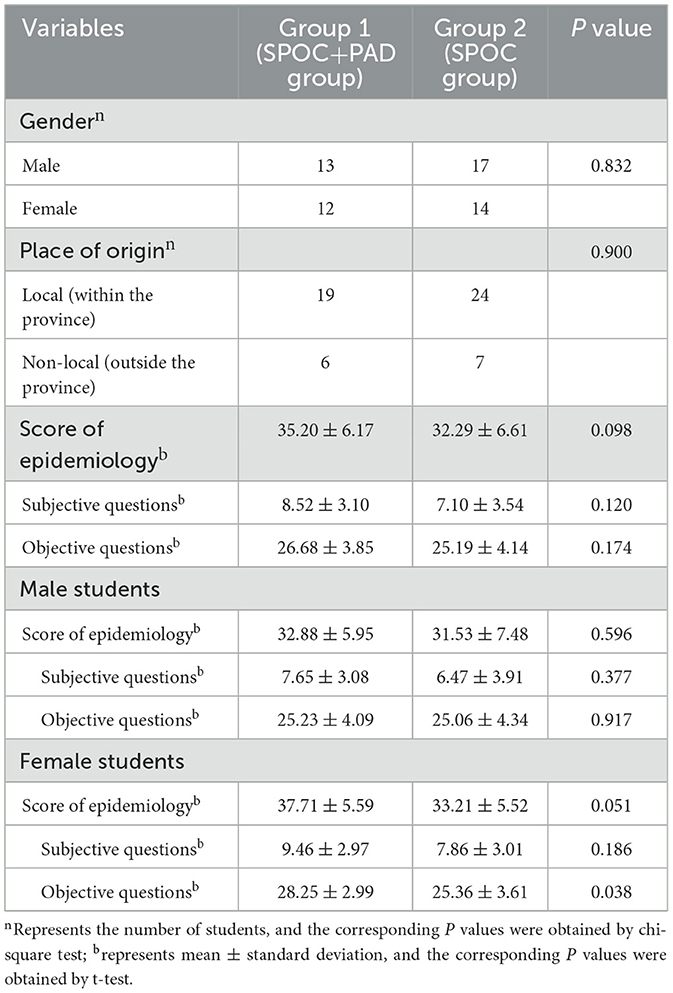- 1Department of Epidemiology and Health Statistics, School of Public Health, Fujian Medical University, Fuzhou, China
- 2Department of Medical Epidemiology and Biostatistics, Karolinska Institutet, Stockholm, Sweden
Background: The blended teaching model of “online theory + offline practice” has become a focal point in the new era of medical education. However, the combination of Small Private Online Course and Presentation-Assimilation-Discussion (SPOC+PAD) classroom has not been practiced in Epidemiology courses.
Methods: To thoroughly evaluate the “SPOC+PAD” blended teaching model, this study included 56 students from a medical university, who selected the course Medical Statistics and Epidemiology in Fujian Province, China. Written final exam scores, lifelong learning abilities and collaboration skills were assessed and compared using t test between 25 students with “SPOC+PAD” teaching model and 31 students with “SPOC” only model. A multivariable linear regression model was further conducted to examine the factors influencing final exam score.
Results: In the final exam for epidemiology, the mean score of students with “SPOC+PAD” was 35.20 ± 6.17 points, slightly higher than that of students with SPOC only (32.29 ± 6.61 points). Students' gender is a key factor affecting final exam scores. Among female students, compared with SPOC teaching, the “SPOC+PAD” blended teaching model can significantly improve final exam score (P = 0.038). However, the role of this teaching model in enhancing students' lifelong learning ability and collaboration skills was not significant.
Conclusions: Compared with SPOC teaching, the “SPOC+PAD” blended teaching model can improve the study outcomes, especially in female students. Evaluation of lifelong learning ability and collaboration skills may require further study with larger sample sizes and longer teaching cycles.
Introduction
The blended teaching model of “online theory + offline practice” has become a focal point in the new era of medical education. Relevant research indicates that this model can effectively improve the learning atmosphere, enhance students' autonomous learning abilities, promote classroom interaction between teachers and students, and transform the traditional teacher-centered approach into a student-oriented one guided by teachers (Yang F. et al., 2024). However, challenges have emerged during its implementation, such as high absenteeism rates and teachers' incomplete grasp of students' learning progress. The modified SPOC (Small Private Online Course) model offers a potential solution to these issues. In recent years, SPOC-based teaching applications have gained significant traction in higher education, with SPOC platforms being implemented in numerous medical courses like Neurology and Oncology (Li et al., 2024; Vaysse et al., 2021), yielding favorable outcomes.
Meanwhile, the PAD (Presentation-Assimilation-Discussion) classroom, a distinctive teaching model, highlighted its effectiveness in enhancing students' learning interest, initiative, and critical thinking abilities (Zhai et al., 2022; Wen et al., 2024). The PAD class may make up for the deficiencies of the pure SPOC course and improve students' abilities in summarizing and identifying problems, as well as internalization, absorption, and re-creation, which are lacking in SPOC only learning. However, no study yet combined and compared these teaching models to assess their effectiveness.
This study innovatively integrates the SPOC and PAD models, designing a comprehensive curriculum system that includes “pre-class guidance, online guided self-study, post-class assimilation, and in-class discussion.” Ultimately, this study aims to evaluate the impact of this novel teaching approach on students' academic performance and comprehensive skill development.
Methods
This study was conducted in a class of students enrolled in 2023 and major in clinical medicine, who selected the course Medical Statistics and Epidemiology at a medical university in Fujian Province, southeast of China. Medical doctors in China are trained in a 5 + 3 program nowadays (5 years of undergraduate medical education plus 3 years of the standardized resident training or 3 years of postgraduate education with professional degree). These students were at their second year of undergraduate medical education. For this study, the class was divided into two smaller teaching groups. We then created a Small Private Online Course (SPOC) for Epidemiology on the Chaoxing Learning Platform. Learning resources such as course introductions, syllabus, teaching schedules, recommended readings, lecture slides, recorded videos, and chapter quizzes were uploaded to the platform.
To evaluate the impact of integrating the Presentation-Assimilation-Discussion (PAD) model into a traditional SPOC course, Group 1 (the intervention group) received a blended “SPOC+PAD” module, while Group 2 (the control group) received only the standard SPOC instruction. The components of the blended module included:
1) Review and Pre-Class Guidance (Pt): the teacher reviewed the last chapter or provided an overview of the next chapter's knowledge framework, key concepts, and foundational content to orient students toward scientific thinking in epidemiological methods and applications. Online self-study task sheets were distributed via the Chaoxing platform.
2) Online Guided Self-Study (Ps): Students were required to watch selected course segments on Chaoxing under the teacher's guidance.
3) Post-Class Assimilation (A): Following online self-study, students completed self-assessment tests and submitted discussion questions. The teacher graded the tests to gauge learning progress, identified key review topics for in-class discussions, and curated discussion questions and case studies.
4) In-Class Discussion (D): Guided by the pre-selected review materials, questions, and cases, students engaged in group discussions and case presentations, followed by teacher-led Q&A and summary sessions.
A diagram of the SPOC+PAD Blended Teaching Model is presented in Figure 1 and the detailed teaching schedule is in Table 1.
Assessment methods
To comprehensively evaluate the professional competencies of the medical students, this study used final exam scores as the primary assessment metric while also evaluating students' lifelong learning abilities and collaboration skills. The final exam of this course was conducted in the form of a written test, with question types including subjective questions (calculation questions and case analysis questions) and objective questions (single-choice questions and true/false questions) with a total score of 53. The evaluation framework for lifelong learning abilities in Chinese medical students comprised six dimensions: attitude and awareness, self-management, thinking pathway, adaptability, information literacy, and communication skills (Wu et al., 2021). The assessment scale for collaboration skills included three dimensions: inclusivity, reciprocity, and sociability (Hinyard et al., 2019). These questionnaires were sent out to all the 99 students in the class. Among them, 56 students completed all surveys, and were included in the analysis. The study was performed in accordance with the principles stated in the Declaration of Helsinki. All the students consented to participate in the study.
Statistical analysis
Scores for the final exam were calculated in total and separately with subjective and objective questions. Scores for lifelong learning ability and collaboration skills were also computed. Independent sample t-tests were used to compare differences in final exam scores and skill scores between the two groups, with stratified analysis by gender. Additionally, a multivariable linear regression model was used to identify factors influencing final exam scores. Statistical analyses were performed using STATA 15.1.
Results
Final exam scores
For the students involved in the study, no statistically significant differences were found between the two groups in terms of gender or place of origin (Table 2). The mean score of Group 1 (the “SPOC+PAD” group) was 35.20 ± 6.17 points, slightly higher than that of Group 2 (32.29 ± 6.61 points). The mean scores of both subjective and objective questions in Group 1 were approximately 1.5 points higher than those in Group 2, and the standard deviations of the scores in Group 1 were smaller than those in Group 2.
Stratified analysis by gender revealed that the score improvement was more significant among female students. Particularly, the scores of female students in the “SPOC+PAD” group in the objective questions were significantly higher than those of female students in the SPOC only group (P = 0.038).
The results of multivariable linear regression analysis showed that scores in the medical statistics part and students' gender were significant influencing factors (P < 0.05). Although differences in teaching models and students' place of origin might affect the final scores, their effects were not significant (Table 3).

Table 3. Results of regression analysis on influencing factors of students' final grades in epidemiology.
Lifelong learning abilities and collaboration skills
After the last class of the course, students completed questionnaires assessing lifelong learning abilities and collaborative skills. The total score for lifelong learning abilities was 95 points, with a mean score of 79.85 ± 12.62 (range: 52–95 points). For collaboration skills, the total score was 65 points, with a mean score of 52.34 ± 7.23 (range: 38–65 points).
The total score and scores in all subscales of collaborative skills in the “SPOC+PAD” group were higher than those in students receiving only SPOC model, but the differences did not reach statistical significance (Table 4). The mean score of lifelong learning abilities and most of the subscales in the “SPOC+PAD” group was also higher than those in the SPOC only group. However, all these differences were not statistical significant.

Table 4. Comparison of collaborative skills and lifelong learning ability between the two groups of students.
Discussion
This study has conducted a preliminary exploration on the specific integration methods and sequential design of SPOC and PAD in the content of epidemiology course. After online-offline blended learning, the PAD class model is used to induce and summarize key contents to test the effect of students' internalization and absorption. Discussions are then conducted to further deepen students' impression and improve learning quality and teaching effectiveness (Liu, 2021). In addition, compared with the PAD class, the presentation forms of learning contents in the SPOC model are more diverse and more in line with students' learning psychology (Busto et al., 2021). The traditional PAD class mainly uses teachers' courseware as the medium, which has poor visual effects (Wen et al., 2023), while the SPOC teaching model improves this shortcoming of the traditional PAD class.
For students, the “SPOC+PAD” teaching model incorporates new elements and adopts new models in curriculum design (Liu and Tayag, 2024), which can enhance students' mastery of course knowledge points. In this study, the average score of the final written exam in the “SPOC+PAD” group was higher than that of students in the SPOC only group, with a lower standard deviation, which is similar to previous findings in the courses of Vocational Information Technology and Microbiology (Yang C. et al., 2024; Xu and Xie, 2022). However, in those prior studies, the “SPOC+PAD” teaching groups exhibited significantly higher final exam scores, whereas the effect observed in our study was less pronounced. This discrepancy may stem from the differences in the selection of control groups. Specifically, the control group in our study adopted the SPOC teaching model, whereas the previous studies used only traditional teaching models. Given that the SPOC teaching model itself has been shown to enhance learning effectiveness in epidemiology courses (Gaizhen et al., 2022), it is reasonable to infer that this contributed to the weaker effect of “SPOC+PAD” model observed in our study. Nevertheless, our results indicates that the “SPOC+PAD” teaching model can improve students' mastery of course knowledge and take into account students at different levels. As this difference is borderline significant, due to the relatively small sample size, larger-scale studies are still needed for verification.
Gender difference is an important factor affecting students' performance. In medical-related majors, female students generally have better academic performance than male students, which is related to female students' more serious learning attitudes and higher compliance with teachers' arrangements (Hassan and Hassan, 2016). Most female students can actively participate in all stages of the course, master knowledge points, and thus achieve higher scores in exams (Fischer et al., 2013). The results of this study show that female students' final scores are higher than those of male students, which is consistent with previous studies (Algarni, 2024). In addition, the effect of the “SPOC+PAD” teaching model on exam scores is more significant among female students, which may also be related to female students' better implementation of teaching arrangements.
When stratifying the final exam scores by question types, we found that female students in the “SPOC+PAD” group achieved significantly higher scores on objective questions than those in the SPOC-only group. However, this between-group difference was not statistically significant for subjective questions. Given that epidemiology courses focus heavily on study designs and related concepts, the “SPOC+PAD” teaching model may better facilitate students' memorization and comprehension of such content through knowledge assimilation and collaborative discussion. In contrast, the model's effect on subjective question performance was less marked. Owing to the limited sample size in our study, we cannot rule out the possibility that “SPOC+PAD” does have an impact on subjective question scores.
Although the difference was not statistically significant, we observed a slightly stronger lifelong learning ability among students in the “SPOC+PAD” group. Prior research has demonstrated that the PAD teaching model fosters students' autonomous learning in English courses—an outcome that not only facilitates exam preparation but also enhances their potential to develop lifelong learning abilities (Liao and Guo, 2022). Similarly, in health assessment courses, the integration of PAD with the BOPPPS (Bridge-in, Objectives, Pre-assessment, Participatory Learning, Post-assessment and Summary) model has been shown to motivate students to actively explore diverse knowledge resources and cultivate sustained, self-directed learning behaviors, which in turn contribute to the development of lifelong learning abilities (Wang et al., 2025). However, no previous studies have evaluated the impact of the “SPOC+PAD” model on students' lifelong learning ability. This non-significant finding is not unexpected, as a single course is unlikely to produce substantial changes in lifelong learning ability; detecting such effects may require a larger sample size or the implementation of the model across multiple courses.
Collaboration skill is another key competency for medical students—particularly for future physicians, who must collaborate with nurses, patients, and other healthcare professionals to deliver high-quality care (Teuwen et al., 2024). In our study, the collaboration skill score was slightly higher in the “SPOC+PAD” group compared to the SPOC only group. This finding aligns with a previous study, which demonstrated enhanced collaboration skills among students in nursing courses using the “Rain Classroom (a MOOC-based platform) + PAD” teaching model (Lv et al., 2024). Indeed, even the PAD model alone has been shown to improve collaboration skills among medical students in health education courses (Xue et al., 2025), indicating that the PAD teaching model exerts an independent effect on fostering collaboration skills.
Despite the novelty of integrating two innovative teaching models, this study still has several limitations. First, evaluations of students' lifelong learning abilities and collaborative skills were conducted only at the end of the course, considering issues related to student adherence in completing questionnaires. As a result, the changes in their abilities and skills during the teaching process remain unknown. Second, numerous factors may influence final exam scores. Although gender, place of origin, and scores from related courses (e.g., statistics) have been included, several other potential influencing factors—such as memory skills and time spent reviewing the course—were not collected in this study. In our study, the effect of the “SPOC+PAD” teaching model was only compared to that of the SPOC-only model; thus, we were unable to isolate the specific effect of the SPOC teaching model itself. Therefore, in the future expanded studies, a PAD only teaching model could be added to disentangle the distinct effects of each teaching model.
Conclusions
In general, this study show that “SPOC+PAD” teaching model can significantly enhance clinical medical students' mastery of epidemiological knowledge, especially female students. Further studies with larger sample sizes are still needed to evaluate the effect on students' lifelong learning ability and collaboration skills.
Data availability statement
The raw data supporting the conclusions of this article will be made available by the authors, without undue reservation.
Ethics statement
This study does not involve sensitive personal information or high-risk interventions. All research procedures have been approved by Fujian Medical University, and are fully compliant with national ethical guidelines, as well as the fundamental principles outlined in the Declaration of Helsinki. Informed consent was obtained from all students in the study.
Author contributions
HY: Data curation, Formal analysis, Funding acquisition, Writing – original draft, Writing – review & editing. RF: Investigation, Methodology, Project administration, Writing – original draft, Writing – review & editing. TL: Data curation, Resources, Validation, Visualization, Writing – review & editing. FH: Conceptualization, Supervision, Writing – review & editing.
Funding
The author(s) declare that financial support was received for the research and/or publication of this article. Haomin Yang was supported by Fujian Medical University Educational and Teaching Research Project [grant no: J23032]. The sponsor of the study had no role in study design, data collection, data analysis, data interpretation, or writing of the report.
Acknowledgments
We appreciate all the participants in this study for their important contributions.
Conflict of interest
The authors declare that the research was conducted in the absence of any commercial or financial relationships that could be construed as a potential conflict of interest.
Generative AI statement
The author(s) declare that no Gen AI was used in the creation of this manuscript.
Any alternative text (alt text) provided alongside figures in this article has been generated by Frontiers with the support of artificial intelligence and reasonable efforts have been made to ensure accuracy, including review by the authors wherever possible. If you identify any issues, please contact us.
Publisher's note
All claims expressed in this article are solely those of the authors and do not necessarily represent those of their affiliated organizations, or those of the publisher, the editors and the reviewers. Any product that may be evaluated in this article, or claim that may be made by its manufacturer, is not guaranteed or endorsed by the publisher.
References
Algarni, A. (2024). Biomedical students' self-efficacy and academic performance by gender in a flipped learning haematology course. BMC Med. Educ. 24:443. doi: 10.1186/s12909-024-05421-2
Busto, S., Dumbser, M., and Gaburro, E. (2021). A Simple but efficient concept of blended teaching of mathematics for engineering students during the COVID-19 Pandemic. Educ. Sci. 11:56. doi: 10.3390/educsci11020056
Fischer, F., Schult, J., and Hell, B. (2013). Sex differences in secondary school success: why female students perform better. Eur. J. Psychol. Educ. 28, 529–543. doi: 10.1007/s10212-012-0127-4
Gaizhen, J., Guomin, Q., and Huijun, Y. (2022). Hybrid learning with SPOC and Tencent classroom in epidemiology course amid the pandemic. Chin. High. Med. Educ. 36, 70–72. doi: 10.3969/j.issn.1002-1701.2022.03.033
Hassan, N., and Hassan, T. (2016). Female students get more marks as compared to male students: a statistical study. J. Bus. Finan. Affair 5:226. doi: 10.4172/2167-0234.1000226
Hinyard, L., Toomey, E., Eliot, K., and Breitbach, A. (2019). Student perceptions of collaboration skills in an interprofessional context: development and initial validation of the self-assessed collaboration skills instrument. Eval. Health Prof. 42, 450–472. doi: 10.1177/0163278717752438
Li, X., Li, F., Liu, W., Xie, Q., Yuan, B., Wang, L., et al. (2024). Effectiveness of the application of small private online course combined with PBL model based on massive open online course in the teaching of neurology. BMC Med. Educ. 24:1518. doi: 10.1186/s12909-024-06460-5
Liao, H., and Guo, Q. (2022). The research on the teaching design of english reading in junior middle school based on the model of PAD class. Int. J. Educ. Human. 5, 75–81. doi: 10.54097/ijeh.v5i1.1942
Liu, F., and Tayag, J. (2024). Effect of Small Private Online Course + Presentation, Assimilation, Discussion (SPOC+PAD) on Student Achievement in a Computer Course. Int. J. Multidis. Res. 6:25589. doi: 10.36948/ijfmr.2024.v06i04.25589
Liu, J. (2021). The important role of pad classteaching mode in enlightening college students' thinking. Curric. Teach. Methodol. 4, 6–10. doi: 10.23977/curtm.2021.040302
Lv, H., Tang, L., Luo, G., Meng, M., and Luo, Q. (2024). Rain classroom and PAD class blended learning mode effectively improves teaching quality in a surgical nursing course. Am. J. Transl. Res. 16, 200–7. doi: 10.62347/CWAJ4534
Teuwen, C. J., Kusurkar, R. A., Schreurs, H., Daelmans, H. E. M., and Peerdeman, S. M. (2024). Interprofessional collaboration skills and motivation one year after an interprofessional educational intervention for undergraduate medical and nursing students. BMC Med. Educ. 24:269. doi: 10.1186/s12909-024-05262-z
Vaysse, C., Fize, A. L., Despas, F., Chantalat, E., Serrano, E., Beyne-Rauzy, O., et al. (2021). Small private online course in teaching oncology-feedback after 1 Year: What lessons? J. Cancer Educ. 36, 65–71. doi: 10.1007/s13187-019-01598-z
Wang, Q., Sun, Z., Wang, D., and Cao, L. (2025). Synergizing PAD and BOPPPS: a teaching model's application in health assessment course. Teach. Learn. Nurs. doi: 10.1016/j.teln.2025.07.014. [Epub ahead of print].
Wen, H., Zhang, R., Zhou, Z., Hong, M., Huang, Z., Jiang, Y., et al. (2024). Comparison of lecture-based learning with presentation-assimilation-discussion method in occupational bloodborne exposure education of nursing students, a randomised trial. BMC Nurs. 23:702. doi: 10.1186/s12912-024-02365-2
Wen, L. M., Pan, J., Zhao, Y., Xu, S., and Cui, J. (2023). “Research and practice on the teaching method of “PAD classroom” under the blended model,” in Proceedings of The 7th International Conference on Contemporary Education, Social Sciences and Humanities (Philosophy of Being Human as the Core of Interdisciplinary Research) (ICCESSH 2022), ed. Chistyakova (Atlantis Press) 345–353.
Wu, T., Yin, Z., and Ma, J. (2021). Research on the index system for evaluation of life-long learning capacity of medical students. Chin. J. Med. Educ. 41, 637–641.
Xu, F., and Xie, N. (2022). “SPOC+PAD class” blended teaching model exploration and practice in microbiology teaching. Microbiol. China 49, 1255–1263. doi: 10.13344/j.microbiol.china.210685
Xue, H., Cheng, Y., and Qi, Y. (2025). The application of PAD classroom teaching model in health education course of undergraduate. Health Vocat. Educ. 43, 58–61. doi: 10.20037/j.issn.1671-1246.2025.05.16
Yang, C., Jiang, R., Zhang, X., Lu, Y., and Li, J. (2024). “The innovation research of mixed “SPOC+ PAD class” secondary vocational information technology course,” in Proceedings of the 2024 5th International Conference on Education, Knowledge and Information Management (ICEKIM 2024), ed. Y. Kuang (Atlantis Highlights in Computer Sciences) 316–323.
Yang, F., Liu, P., Duan, P., and Zhang, D. (2024). Evaluating blended teaching models in medical colleges: preferences and influential factors for teachers and students. Adv. Med. Educ. Pract. 15, 1195–1203. doi: 10.2147/AMEP.S487408
Keywords: small private online course (SPOC) platform, PAD, epidemiology, lifelong learning ability, collaboration skills
Citation: Yang H, Fu R, Lin T and He F (2025) Exploration and practice of the “SPOC+PAD class” blended teaching model in the course of epidemiology. Front. Educ. 10:1670084. doi: 10.3389/feduc.2025.1670084
Received: 23 July 2025; Accepted: 01 September 2025;
Published: 23 September 2025.
Edited by:
Anila Jaleel, Shalamar Medical and Dental College, PakistanReviewed by:
Rafia Minhas, Central Park Medical College, PakistanQurratulain Aamir, Rahbar Medical & Dental College, Pakistan
Copyright © 2025 Yang, Fu, Lin and He. This is an open-access article distributed under the terms of the Creative Commons Attribution License (CC BY). The use, distribution or reproduction in other forums is permitted, provided the original author(s) and the copyright owner(s) are credited and that the original publication in this journal is cited, in accordance with accepted academic practice. No use, distribution or reproduction is permitted which does not comply with these terms.
*Correspondence: Haomin Yang, aGFvbWluLnlhbmdAa2kuc2U=; Fei He, aS5mZWkuaGVAZmptdS5lZHUuY24=
 Haomin Yang
Haomin Yang Rong Fu1
Rong Fu1 Fei He
Fei He

